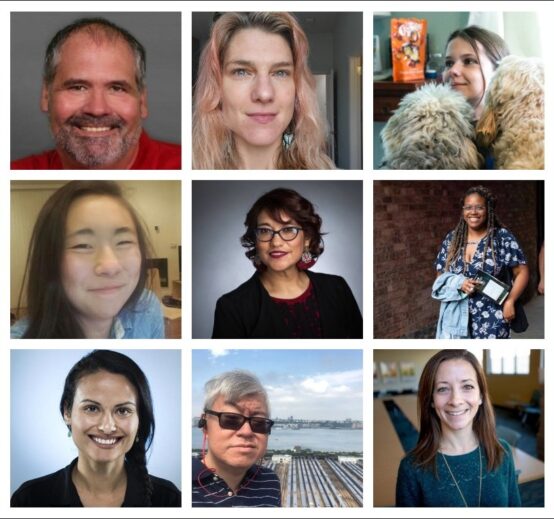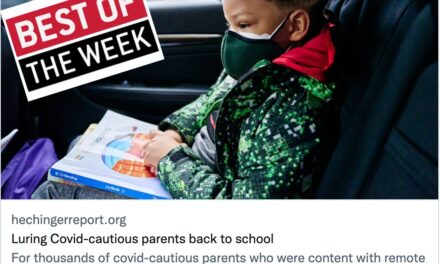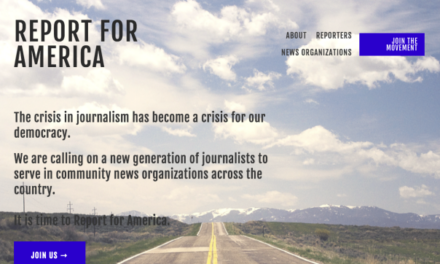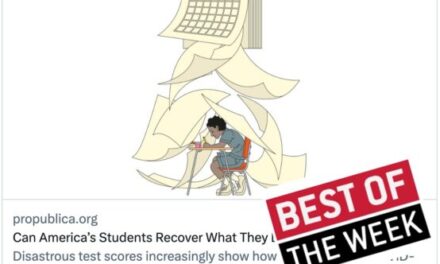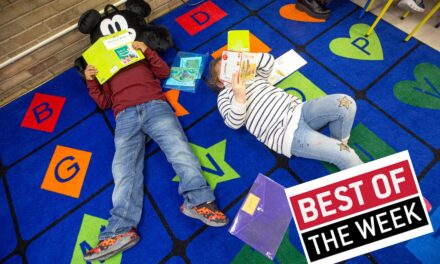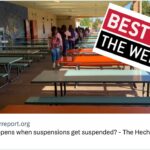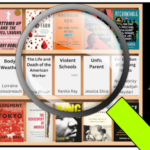A dozen education journalists share their best and worst moments
By Colleen Connolly and Alexander Russo
Two years ago, most of the nation’s public schools shut down, launching a tremendously difficult time for everyone, including education journalists.
The unprecedented shutdown created enormous education coverage demands and access problems. Some reporters were new to the beat or to the city they were covering. Many were juggling parenting duties as well as working from home.
On the two-year anniversary of the pandemic, here are a few of the most memorable moments education journalists experienced during the past two years, in their own words, describing what it was like covering schools during the pandemic.
Thanks to WBUR’s Carrie Jung, the Los Angeles Times’ Paloma Esquivel, NPR’s Anya Kamenetz, the Sun Sentinel’s Scott Travis, the Des Moines Register’s and Iowa City Press-Citizen’s Cleo Krejci, The Economist’s Tamara Gilkes Borr, The San Diego Union-Tribune’s Kristen Taketa, Chalkbeat Chicago’s Samantha Smylie, The (Raleigh) News and Observer’s Keung Hui, The 74’s Mark Keierleber, The Philadelphia Inquirer’s Kristen Graham, The Dallas Morning News’ Eva-Marie Ayala, and others for sharing what happened to them.
Not included but not forgotten are those journalists who are too exhausted or busy to process their feelings about such a difficult time.
MARCH 2020: THE PANDEMIC BEGINS
I remember the story I did on the day that Boston said they were closing and trying to snag a principal at one of the Boston public schools, which I subsequently got in trouble for — for not going through their comms people. But everyone was so ready to talk and share their feelings about the unknown. And it’s really weird to think back at those interviews now, comparing how much we knew then — and now. – Carrie Jung, WBUR
The first story I helped the ed team with was published on March 3, 2020, and was headlined: “Coronavirus has schools preparing for the last resort: closures.” I remember thinking at the time that the possibility of full closures was small, and I wanted to be very cautious in our headline so as not to create unwarranted anxiety. The second story I helped with was published on March 12. It was about how students at USC and UCLA had shifted to online learning. My editor asked me to go to USC to try and find students to interview, and I remember how that normally bustling campus was eerily empty and quiet and it was a struggle to find people to talk with. – Paloma Esquivel, L.A. Times
My editor asked me to go to USC to try and find students to interview, and I remember how that normally bustling campus was eerily empty and quiet. – Paloma Esquivel, L.A. Times
I remember getting back to my parents’ home on a Friday and my Slack alerts started to ding. My editor was letting me know that the CEO of Chicago Public Schools at (the) time, Janice Jackson, and (Mayor) Lori Lightfoot were going to close a school in Chicago that serves students with disabilities because they had a case of the coronavirus. I was frazzled at the time because I just left the office and made it back home and was like, “I can’t get back downtown during rush hour.” It was a good thing the news was streamed live and I wrote it as fast as I possibly could. I just remember thinking, “How many schools are they going to close next?” just to find that over a week later, the governor would close schools throughout the state’s 852 school districts. – Samantha Smylie, Chalkbeat Chicago
PANDEMIC LIFE: BLURRING HOME AND OFFICE
The first day I was told to work from home instead of coming into the office was the day before schools closed. On that Friday, March 13, I churned out updates about schools closing, one by one, typing on my laptop as I sat on my black leather couch in my apartment’s small living room because I didn’t have a work desk. I worked off that couch for the first several weeks of the pandemic, and it wrecked my neck and my back. – Kristen Taketa, San Diego Union-Tribune
I am lucky that I lived by myself, which was a blessing and a curse, mostly a blessing. I don’t have kids or anything like that. So I luckily did not have to try to figure out childcare and worry about my own kids getting sick or anything like that. So I had it pretty easy, I would say. As far as my personal life goes, work was busy and it was such a hard pivot to remote learning, we had a lot to do. I kept busy and then it was just like business as usual, except business was out of my guest bedroom and not the office. – Carrie Jung, WBUR
As a parent, there were a lot of ‘How the hell is this going to work?’ moments as I had to figure out how to get my very busy job done and care for my then-first grader and preschooler. There still are, honestly! Worst/funniest moments: Any of the times my kid shouted out “I HAVE TO GO TO THE BATHROOM” (or something more graphic!) while I was Zoom interviewing someone. That was my life for a long time. To my interview subjects’ credit, no one ever made me feel badly about it. That’s the benefit of covering educators and parents, I guess: they get it! – Kristen Graham, Philadelphia Inquirer
As a parent, there were a lot of ‘How the hell is this going to work?’ moments – Kristen Graham, Philadelphia Inquirer
REMOTE REPORTING
Reporting on schools during lockdown was incredibly difficult. I found myself relying a lot on community groups to put me in touch with parents and students in situations where normally I’d just go to a school, stand outside and talk to anyone willing to talk with me. There was also very little access to any real data about how things were playing out, so we relied heavily on anecdotes. One thing I’m glad about is that our team decided to do an extensive survey of California school districts to examine the differences in distance learning among various communities…That really helped us document what was happening in the moment. – Paloma Esquivel, L.A. Times
It wasn’t a difficult adjustment for me. I loved my morning commute to the office because I got to see the city every day and see my colleagues, but I would find myself easily distracted in the office. Working at home made it easier for me to focus on work, but I had to be intentional about creating a workspace that is separate from my bedroom — when I lived at home with my parents I would go into our kitchen. Sometimes, I felt confined to one space and wished I had the choice to go to the office or a coffee shop. – Samantha Smylie, Chalkbeat Chicago
It’s not like I was super social beforehand, but you don’t realize how much socializing you do at work. – Carrie Jung, WBUR
I happen to love working remotely, so this has actually been a positive outcome of the pandemic for me. I am very introverted. I love talking to sources, of course, but I get more work done and I’m far less anxious when I’m working from home. I do miss spending time in my college newsroom, though. I didn’t really get to say goodbye to the place where I started my journalism career. – Cleo Krejci, Iowa City Press-Citizen/Des Moines Register
I think the biggest change was learning how to be by myself for a long period of time. It’s not like I was super social beforehand, but you don’t realize how much socializing you do at work. But I also got to know all of my neighbors a whole lot better, and I think that was a sort of silver lining out of all of it. – Carrie Jung, WBUR
NEWSROOM LAYOFFS AND RACIAL RECKONINGS
Chalkbeat didn’t have any layoffs — my colleagues and I were really lucky. I was really scared about losing my job at the beginning of the pandemic because so many of my friends just got a new job and were laid off immediately or hours were reduced. I just kept thinking about what I would do next if that happened to me or my parents. I’m beyond grateful that I was able to keep my job. – Samantha Smylie, Chalkbeat Chicago
For me, the newsroom reckoning that happened in the aftermath of the murder of George Floyd felt long overdue. I felt incredibly proud of my colleagues who spoke out during that time and demanded that the newspaper change the way it approaches covering Black and Latino communities and how it treats Black and Latino staffers. We continue that work today through the L.A. Times Guild Black Caucus, Latino Caucus, and others. – Paloma Esquivel, L.A. Times
For me, the newsroom reckoning that happened in the aftermath of the murder of George Floyd felt long overdue. – Paloma Esquivel, LA Times.
We had a round of layoffs in the beginning. It was something that we knew was coming at some point that summer, so we had a general idea when they might be coming, but the exact day we didn’t. I remember when the calls started going around thinking, am I getting this call? That was definitely scary. It was also really sad to lose some really good coworkers too. It was weird to go through that not at the office, like you were going through it together, but separately. – Carrie Jung, WBUR
UNFORGETTABLE MOMENTS
I won’t forget how surreal it felt to watch students go through temperature checks and health screening questions before they could enter the school. Then walking in and seeing how different things were with students wearing masks and avoiding physical contact with other people. Considering how important physical touch is at the K-5 level, it was sad seeing how teachers couldn’t approach kindergarteners for fear of COVID. I couldn’t avoid going back into buildings so that was part of my job. I felt more confident when I got my shot last March. But even before the shot, as I said, I really had no choice. If I was going to do my job properly, I had to be in the school buildings as much as possible. I’m really the only full-time K-12 ed reporter here so I’m not sure. I masked up and did the social distancing routine while visiting schools. It’s hard to report on what’s going on in schools unless I’m there to see how dystopian it got. – Keung Hui, The News and Observer
It’s hard to report on what’s going on in schools unless I’m there to see how dystopian it got. – Keung Hui, News and Observer
I’ll never forget how, particularly in the first weeks and months of the pandemic, the people who work in schools switched into protector mode for their most at-risk students. I’m thinking of one story in particular, about the school staff working to help their homeless students. Due to all of the disruptions early on, a lot of kids experiencing homelessness fell off the grid. I interviewed schools’ homeless liaisons, who shared heartbreaking stories about how the pandemic had been particularly difficult for this student population. – Mark Keierleber, The 74
This was probably my most memorable pandemic day: July 28 of last year. At the onset of Delta, they canceled a meeting on masks because protestors refused to wear masks and got rowdy. Then they had a capital budget meeting that night and tried to kick me and another attendee out and watch it outdoors. I often felt like the school district used the pandemic to restrict access. – Scott Travis, South Florida Sun-Sentinel
I often felt like the school district used the pandemic to restrict access. – Scott Travis, South Florida Sun-Sentinel
One of my indelible memories is dropping in on a Manhattan high school class over Zoom the morning after the insurrection on Jan. 6. The teacher had been up all night messaging with fellow social justice-oriented teachers about the lesson plan for the day. He was still in his bed as were some of his students. Together they struggled to process events that for many had been both a flashback and a contrast to the previous summer’s protests, which were fiery in New York City. The circumstances were unbelievably challenging, many students were silent with cameras off, but it’s also true that because of the online forum I was able to witness a teacher showing up for his students at an emergent moment in an immediate and intimate way. – Anya Kamenetz, NPR
I interviewed a mom whose 17-year-old son almost died from Covid. He was on a respirator for three weeks. It was all in Spanish. She was sobbing on the phone. I will never forget it. – Cleo Krejci, Des Moines Register/Iowa City Press-Citizen
For me, the “this is going to change everything” moment was realizing while every suburban district and private school was sending students home with devices to do work remotely, Philadelphia was sending kids home with nothing. It didn’t have the devices, infrastructure, or money to equip kids to learn digitally. For however long the pandemic lasted, I knew the story was going to be about inequity, about widening gaps. – Kristen Graham, Philadelphia Inquirer
He was on a respirator for three weeks. It was all in Spanish. She was sobbing on the phone. I will never forget it. – Cleo Krejci, Des Moines Register/Iowa City Press-Citizen
Hands down the most memorable for me was my team juggling the pandemic and the February 2021 Texas freeze. My reporters were working to quickly put into context how yet another round of traumatic events was impacting kids and could “change a generation.” And most of the Ed Lab team members were working on this while we had no electricity in our own homes (literally going back and forth to our cars to charge phones/warm up). But the urgency to tell these stories — like so many important ones in the pandemic — kept us all going. And yes, it’s been a long and exhausting two years. – Eva-Marie Ayala, Dallas Morning News
In April 2020, I set out to profile an Inglewood teacher who was spending her mornings helping distribute food to families from her school before going home to prepare lessons for her students in the afternoons. I’ll never forget getting to the school and seeing families lined up around the block with little kids in masks, waiting for food and other necessities. As they picked up their food, the teachers were also checking to see if the kids needed laptops or help with their computers. I talked to many of the parents in line and everyone I talked to had lost their job and many were wondering how they were going to pay rent the next month. I remember wondering how it was possible that kids could do any academic learning in a situation like that. That moment has stayed with me throughout the pandemic. – Paloma Esquivel, LA Times
RETURNING TO IN-PERSON
I remember the first in-person reporting trip because it rained that day and I didn’t even care. It was a protest, the teachers unions had all come together to protest working conditions. That happened at the state house and I just remember really being like, “Oh yeah, this is fun — this is why I do my job.” – Carrie Jung, WBUR
It really felt like we really were out on the front lines, venturing out into public into the unknowns of a pandemic while everyone else I knew was sheltering at home. – Kristen Taketa, San Diego Union-Tribune
The first time I reported in person was actually on the day schools closed, on March 13, because San Diego Unified held an in-person press conference announcing their closure. Then I reported in person again the following Monday, going out to schools to report on the meal distribution efforts. It felt strange being out in person, and it really felt like we really were out on the front lines, venturing out into public into the unknowns of a pandemic while everyone else I knew was sheltering at home. – Kristen Taketa, San Diego Union-Tribune
My first in-person reporting after the initial lockdown was that April 2020 story when I visited a food distribution effort at a school in Inglewood. I was very afraid of catching COVID and I remember repeatedly reaching for the sanitizer in my purse and changing my clothes after I got home. At the same time, I was also surrounded by teachers, who were also worried, but were still out there volunteering their time to hand out food. So that helped me put my own concerns in perspective. It was also wonderful to be out in the world again, getting to do one of the things I love most about reporting, which is documenting things as they happen. – Paloma Esquivel, LA Times
WHAT’S AHEAD
It was a challenge naturally as we had trouble doing what’s most important — getting out there inside schools and talking to families. I felt the light and the heat of the spotlight. Americans started talking about schools, childcare, etc., and we led the news for a period of time. I hope we can keep that energy and attention. – Anya Kamenetz, NPR
The hardest part was getting people to agree to do anything in person, which made it hard to get photographs for a lot of stories. I also missed — and still miss — being in a newsroom with a lot of people. … The best part was the availability of so many meetings on Zoom or Teams. I was able to attend or watch on demand many committee and school advisory meetings that I would have never had time to attend in person. I hope the recording and easy accessibility of these meetings continues. – Scott Travis, South Florida Sun-Sentinel
Americans started talking about schools, childcare, etc., and we led the news for a period of time. I hope we can keep that energy and attention. – Anya Kamenetz, NPR
I think Zoom is a permanent part of reporting now, and that’s probably a good thing. It’s not always possible to get out to an interview in person, so it’s good to have another way to talk with someone face-to-face, even if it’s on a screen. But it’ll never be a substitute for seeing something in person. – Paloma Esquivel, LA Times
I came in late since I started reporting in 2021. But I realized that we have absolutely no problem amplifying certain voices (white, affluent families) as the voice for all, while labeling other parents based on their specific identities (Black, low-income, essential workers). When white wealthy families wanted their kids to go to school in person, the conversation was framed as “parents want to return to in-school learning.” But when minority parents overwhelmingly wanted remote learning, it was viewed as a non-white fringe perspective. This year has taught me whose opinions will be considered the voice for all. I hope that we will all learn to be careful about that dynamic as we continue reporting broadly, but especially about education. – Tamara Gilkes Borr, The Economist
Since I started covering education in March 2020, my introduction to the beat was really a trial by fire – I was thrown into one of the biggest education stories ever with little opportunity to get my mind around the history behind much of what had been happening in schools up until that point. And for two years I found myself often jumping from news story to news story. What I’m hoping now is that I’ll get time to work towards a deeper understanding of the education history that informs where we are now, and that I can take more time to delve deeply into stories — assuming the constant news calms a little bit. – Paloma Esquivel, LA Times
We will be hearing about the economic fallout on schools to come, and I must be prepared to write those stories. – Samantha Smylie, Chalkbeat Chicago
I see myself continuing to work on the education beat in Chicago. I want to deepen my knowledge on education policy and finances because we will be hearing about the economic fallout on schools to come, and I must be prepared to write those stories. I will continue to write about students with disabilities and what investments school districts are making over time to ensure that they are recovering from learning gaps due to the pandemic. I want to do more investigative reporting in the future as well. When it comes to my personal life, I learned that I have to set strict work-life boundaries. Being a reporter allows me to learn a ton of new things and talk to people all the time — it’s really the best job for my curious mind. But I can’t be a good reporter if I’m burnt out. – Samantha Smylie, Chalkbeat Chicago
I think living through the pandemic in general and actually reporting on the lines at food banks and people having trouble filing for unemployment was a good reminder of how much I have. I think I was more grateful at that point than any other time. I bought a condo during the pandemic. So I have some legitimate roots here, which is kind of cool. I think my future is in Boston. I’m still pretty happy at WBUR so for now I’ll stay the course. – Carrie Jung, WBUR
Previously from The Grade
How education reporters stay safe
Back to school for reporters, too
Education reporters back in schools — and newsrooms
Education reporters share their own back-to-school decisions
Education and race: 9 journalists reflect
ABOUT THE AUTHOR

Alexander Russo
Alexander Russo is founder and editor of The Grade, an award-winning effort to help improve media coverage of education issues. He’s also a Spencer Education Journalism Fellowship winner and a book author. You can reach him at @alexanderrusso.
Visit their website at: https://the-grade.org/

